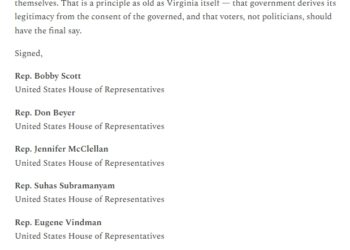
Professor Larry Sabato, a terrific guy and one of the best political minds in the country, has co-written a new analysis of the 2012 elections, including a UVA look at the U.S. Senate race here in Virginia. He rates a likely Allen vs Kaine contest as 50-50.
I disagree: Kaine surely has to be considered the favorite right now by any standard of analysis. A slight favorite admittedly, but the lead dog on the sled. This is no slight of George Allen, but a recognition of the campaign so far since Allen first announced.
Despite Mr. Allen’s best efforts, every time he hears a sound, he gets jittery and looks over his right shoulder thinking the Tea Party Express is closing in on him. Given his huge lead in the GOP primary polls, this suggests he will be doing this all the way to next June, unable to shake the political fear. In that connection, Mr. Allen has already said he will not be endorsing a candidate for President, afraid of alienating anyone.
Bottom line: This means Allen will be leaning as far right as he can for another year, when we know general elections are won with a different tilt in Virginia given where the swing voter stands. This gives Kaine a big advantage, especially since he is odds-on now to win the nomination without a real challenge, as Congressman Scott has made no move to gear-up a statewide primary campaign.
SO: Kaine has a year to go after the swing vote, while Allen still is pinned down in tea party country.
That’s a big advantage to Kaine, at least on the chess board.
However, in fairness to Larry, his analysis of the Virginia race seems to be tied to his larger analysis of the impact of the presidential election on close races for the Senate. His research says that most close Senate races seem to follow the vote at the top of the ticket. This is good stuff.
Accordingly: If you believe an Allen vs Kaine race is going to be close (52-48 one way or another or less, or as close as the Allen-Webb race of 2006), then Larry’s analysis says the winner of the down-ballot Senate race is likely to be Kaine if the President carries Virginia by a decent margin, or Allen if the President loses Virginia by a decent margin.
In that regard, Larry’s research on this direct relationship is something he should expand, because it is very important insight.
However, I still rate Kaine the slight favorite, given how the chess board is situated here in June of 2011. Allen’s campaign is still too focused on the past and on the Tea Party Express for him to be gaining real traction among key independent swing voters. Moreover, Allen’s strategy of running against “Tim Obama” is suspect, given Larry’s thesis.
Why? According to the Professor, it is already baked into the cake automatically. If Sabato is right about the presidential impact on down-ballot Senate races, then a shrewder anti-Kaine or anti-Allen strategy is not to tie them to the national party (many voters do that anyway, says Sabato), but to go after those swing voters who make a more independent judgment.
Since Kaine seems more focused on such a strategy, I rate him a slight favorite now, as Allen seems to have conceded this field to him at least through the GOP primary next June.

![[UPDATED with Official Announcement] Audio: VA Del. Dan Helmer Says He’s Running for Congress in the Newly Drawn VA07, Has “the endorsement of 40 [House of Delegates] colleagues”](https://bluevirginia.us/wp-content/uploads/2026/02/helmermontage.jpg)
















